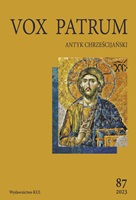Recepcja wczesnochrześcijańskich motywów eucharystycznych w pieśni Dziękujemy Ci, Ojcze nasz
Reception of the Early Christian Eucharistic Motifs in the Song Dziękujemy Ci, Ojcze nasz (We thank Thee, our Father)
Author(s): Stanisław GarnczarskiSubject(s): Cultural history, Social history, Theory of Literature, Sociology of Religion, History of Religion, Sociology of Literature
Published by: Katolicki Uniwersytet Lubelski Jana Pawła II - Wydział Teologii
Keywords: Didache; song; Eucharist; Kazimierz Pasionek; thanksgiving;
Summary/Abstract: The song entitled Dziękujemy Ci Ojcze nasz (We thank Thee, our Father) has its textual origin in an ancient document from the first centuries, entitled Didache tu Kyriu dia ton dodeka apostolon tois ethnesin. The document has the character of church instruc-tions, raising various topics and presenting them in the form of commands and guidelines in moral, legal, ascetic and liturgical matters. In our research, we focused our attention on three points in the Didache (9-10 and 14), which describe the celebration of the Eucharist. It’s about thanksgiving to God for the Eucharist, life, faith and eternal life, and a request for the community of the Church and God’s help on the way to unity with God for eternity. The text and melody of the analyzed song were written by Fr. Kazimierz Pasionek in the 1960s. The exact date is unknown. Certainly, it happened before 1968, because that year during the solemn Holy Mass on the occasion of the 25th anniversary of the priestho-od of Bishop Jerzy Ablewicz, the combined choirs – clerical and cathedral – performed under the direction of the composer himself after Holy Communion Eucharistic Prayeraccording to the text of the Didache. The presented song is an important example of the implementation of the postulates of Vatican II, i.e. a return to patristic sources, reaching for ancient texts. It was done by Fr. Pasionek and many composers of the 21st century do the same, using texts imbued with the beautiful theology of the Eucharist, christology and ecclesiology.
Journal: Vox Patrum
- Issue Year: 2023
- Issue No: 87
- Page Range: 115-134
- Page Count: 19
- Language: Polish

